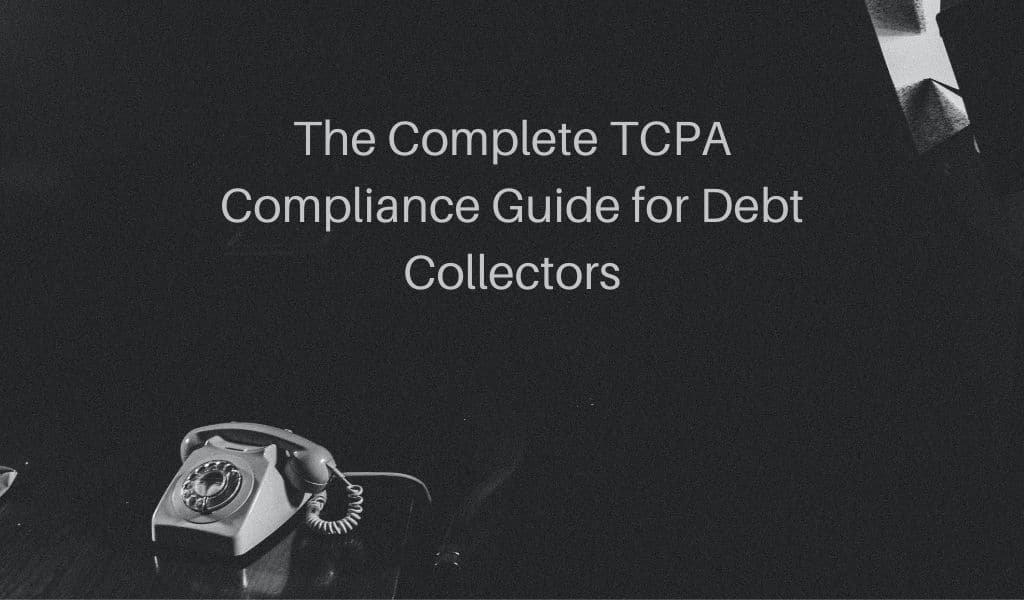Debt collection calls aren’t exempt from government regulations on telemarketing calls. Use this handy TCPA compliance guide to ensure your teams are sticking to the laws.
In 1991, the federal government passed the Telephone Consumer Protection Act (TCPA) to protect individuals from unwanted business phone calls. Amended several times since then, all businesses—including debt collectors—must adhere to these regulations or risk facing legal penalties. That can be hard to do without a TCPA compliance guide to help you understand the most current obligations.
While debt collection isn’t your typical telemarketing service, the industry is still subject to federal and state regulations to protect consumers.
Use this TCPA compliance guide to ensure that you don’t run afoul of the law and end up being hit with citations that can amount to significant fines.
Use TCPA-compliant software like Call Logic so you can stop worrying and start focusing on your business. Schedule a free demo right now to find out more!
What is the TCPA?
The TCPA regulates virtually all telephone solicitations, including those made with auto-dialers or using pre-recorded messages. As of a 2015 FCC order, this includes text messages. In general, the act makes it illegal for a business to make “non-emergency” calls using an automatic telephone dialing system (ATDS) unless they have the required prior express consent from the recipient to receive such calls.
The TCPA works in conjunction with a number of other related laws, mostly overseen by the Federal Communications Commission (FCC). While those regulations, such as the TSA, are important, this TCPA compliance guide won’t go into great detail on them, so we encourage you to research those separately, specifically the Fair Debt Collection Practices Act (FDCPA).
Your easy-to-understand TCPA compliance guide
General provisions
Under the TCPA, telemarketers must adhere to these rules:
- You may not contact residences before 8:00 A.M. or after 9:00 P.M. local time, unless otherwise permitted by the call recipient.
- You have to maintain a “do-not-call” (DNC) list of consumers who’ve asked not to be contacted (in addition to adhering to the National Do Not Call Registry) and honor each request for five years.
- You cannot solicit a residence using an artificial voice or recording.
- You must clearly state your name, the name of the person or entity that you’re representing, and you must provide a phone number or address to contact the entity.
- Autodialed calls that take up two or more lines of a multi-line business are prohibited.
In the event of a TCPA violation, a fine of $500 per unintentional violation may be assessed. If it’s determined that the violation was willful, the fine increases substantially to $1,500 per offense.
Prior express consent
The term “prior express consent” is not actually defined by the TCPA. Instead, the phrase has been interpreted in various ways by the FCC over the years. For the purposes of this TCPA compliance guide, we understand “prior express consent” as a debtor providing their phone number to the creditor, including if the number was provided in the course of the transaction that resulted in the owed debt.
However, the FCC has also said that a debtor may revoke their consent to receive ATDS calls and texts at any time, which can make things difficult for debt collectors. If a debtor revokes their consent, a debt collection representative must use standard phone or other communications to get in touch.
Government exemptions
There was a time when debt collection related to money owed to the government was exempt from some of the restrictions in this TCPA compliance guide. That is no longer the case. In 2019, a Fourth Circuit court deemed the exemption unconstitutional, and the Supreme Court sustained this decision in the summer of 2020. The Supreme Court decision didn’t change anything else about the TCPA, but some debt collectors may still have to adjust their practices.
COVID-19 exemption
In March 2020, the FCC invoked an exemption from TCPA guidelines for COVID-19-related emergency calls. While it’s unlikely that this exemption will apply to debt collectors in most circumstances, we thought it necessary to mention it in a comprehensive TCPA compliance guide. For more information, we encourage you to visit the FCC website.
Protecting your business
Now that you understand the TCPA regulations, here are some ways you can protect your debt collection business.
First, determine whether or not you are using an ATDS. While the TCPA considers an ATDS as “equipment that has the capacity A) to store or produce numbers to be called, using a random or sequential number generator; and B) to dial such numbers,” some jurisdictions have expanded this definition.
If you’re using an ATDS, we highly encourage you to consider Call Logic’s call management system because we are the only auto-dialer available that’s TCPA-compliant. That doesn’t make you exempt from the law, but it offers additional protection when you use an ATDS to make calls.
Another important way to protect yourself is to double-check with your clients (the creditors) that they not only have consent to contact the numbers they have on file, but that said consent is also transferrable to you without additional permission from the debtor. This is especially important if phone numbers have been transferred from debtors to other individuals, or if you use any sort of system to find alternative phone numbers since a debtor may not have consented to calling the alternative number. (This only matters if using an ATDS to call cell phones. If the alternative number is a landline, there’s less risk.)
Finally, make sure that your do-not-call lists are accurate and up-to-date. Call Logic’s system will help you do this automatically, but if you’re not using as sophisticated a system, you’ll need to find other means to regularly ensure you don’t call numbers on either the national list or your own internal lists.
For additional information beyond this TCPA compliance guide about debt collection call regulations, visit the FCC website, familiarize yourself with the FDCPA, and in the case of any questions or uncertainties, contact a knowledgeable attorney who can counsel you on current practices and changes to the regulations.
Stay in compliance with software that knows the rules. Check out a free demo right now to see how our system helps keep you out of trouble.
Please note that this post is for informational purposes only, and should not be considered as professional legal advice.

